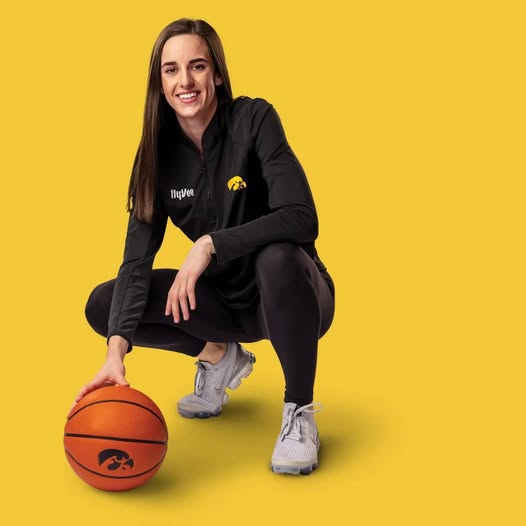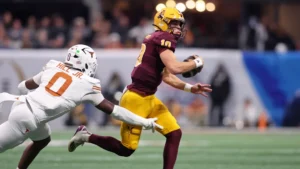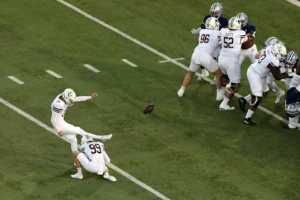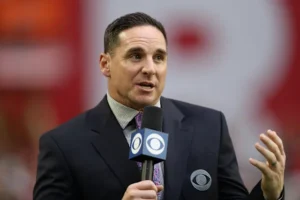
Caitlin Clark, the dynamic guard for the Indiana Fever, entered the WNBA in 2024 with high expectations following a stellar college career at Iowa. Her rookie season was marked not only by impressive performances but also by heightened attention from fans and media alike. A notable aspect of her inaugural year was the emergence of a rivalry with fellow rookie Angel Reese of the Chicago Sky, characterized by on-court exchanges that sparked widespread discussion.TMSPN.com+6People.com+6SI+6Wikipedia+51010 WCSI – News Talk 1010 WCSI+5Fox News+5
The Genesis of the Rivalry
The rivalry between Clark and Reese gained prominence during the 2023 NCAA Women’s Basketball Championship game, where Reese’s LSU Tigers faced Clark’s Iowa Hawkeyes. In the game’s final moments, Reese followed Clark around the court, performing a “you can’t see me” gesture—a taunt popularized by professional wrestler John Cena—and pointed to her ring finger, referencing a championship ring. This act ignited a firestorm of debate, with some criticizing Reese’s sportsmanship and others highlighting a perceived double standard, as Clark had previously used similar gestures without facing comparable scrutiny. 1010 WCSI – News Talk 1010 WCSI+1talkSPORT+1Wikipedia+1talkSPORT+1
Reflecting on this incident, Reese remarked that it was a pivotal moment that changed her life, emphasizing the significance of trash-talking in women’s sports and expressing hope for future collaboration with Clark. 1010 WCSI – News Talk 1010 WCSI+2The Baltimore Post+2Fox News+2
Clark’s Perspective
Throughout the 2024 WNBA season, Clark maintained a focus on her performance, leading the Fever to a playoff berth and earning accolades such as Rookie of the Year and All-WNBA First Team honors. Despite the media’s fixation on her interactions with Reese, Clark remained largely silent on the matter, choosing to let her game speak for itself. However, in a December 2024 interview, she addressed the controversy, expressing confusion over the attention given to the incident and emphasizing her belief that the rivalry was largely fabricated. New York Post+11010 WCSI – News Talk 1010 WCSI+1SI+1talkSPORT+1
Clark also acknowledged the racial dynamics at play, recognizing the privilege associated with her whiteness in a league predominantly composed of Black players. She underscored the importance of elevating Black women in the sport and expressed a commitment to contributing to positive change in this regard. Wikipedia
League Perspectives
The WNBA community’s view of Clark’s trash-talking abilities was highlighted by Las Vegas Aces coach Becky Hammon, who noted that Clark was among the most vocal competitors in the league. Hammon remarked on the engaging nature of Clark and Reese’s exchanges, pointing out that while Reese’s trash talk often garnered attention, Clark was equally, if not more, formidable in this aspect. FirstSportz+2TMSPN.com+2Sportskeeda+2
The Bigger Picture
The Clark-Reese rivalry transcended individual interactions, sparking broader conversations about race, gender, and competitiveness in women’s sports. It drew parallels to historic rivalries in men’s basketball, such as that between Magic Johnson and Larry Bird, and played a significant role in attracting new fans to the WNBA. Both players expressed a mutual respect and understanding of each other’s competitive drive, acknowledging that their on-court exchanges were part of a larger narrative pushing for recognition and respect in the sports world.
Caitlin Clark’s rookie season was a microcosm of the evolving landscape of women’s professional basketball, where athletic prowess and personal narratives intersect to challenge traditional norms. Her experiences with Angel Reese highlighted the complexities athletes face in navigating public perceptions, media narratives, and personal identities. As both players continue their careers, their journey offers valuable insights into the dynamics of competition, representation, and the ongoing quest for equality in sports.





